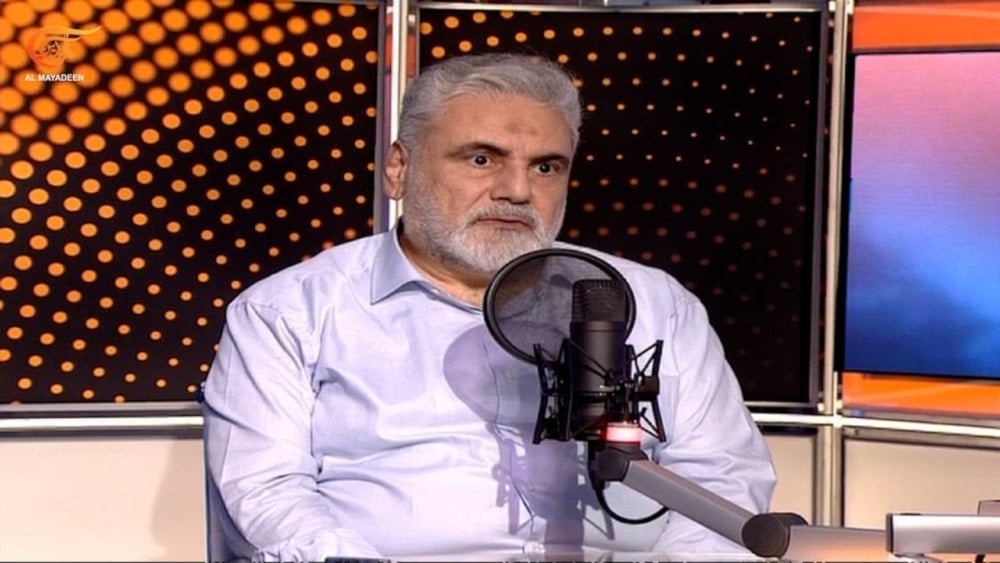'Israel' repeating 2006 July War mistakes, times 2: Hezbollah official
The head of Hezbollah's Resources and Borders department tells Al Mayadeen that the weapons the Resistance has been using for the past 10 months are merely a tiny part of what's in its arsenal.
-

Nawaf al-Mousawi, the head of Hezbollah's Resources and Borders department (Al Mayadeen)
The support front in Lebanon would cease once the Israeli war on Gaza ends, pointed out Nawaf al-Mousawi, the head of Hezbollah's Resources and Borders department, on Friday.
Speaking on Al Mayadeen's "Al-Mashhadia" program, al-Mousawi emphasized that the capabilities and expertise possessed by the Resistance are unmatched by other forces worldwide, even the largest armies.
He mentioned that the Resistance has developed drones that are undetectable and cannot be shot down, noting that the weapons the Resistance has been using for the past 10 months are merely a tiny part of what's in its arsenal.
Reflecting on the July 2006 war, al-Mousawi stated that the events of that war proved that neither the United States nor the Israeli occupation can impose their diktats and that the peoples of the region can fight and thwart these attempts.
The senior Hezbollah official likened the operation carried out by the Islamic Resistance in Lebanon on July 12, 2006, which resulted in the capturing of two Israeli occupation soldiers, to Operation Al-Aqsa Flood executed by the Palestinian Resistance on October 7, 2023.
He explained that in the 2006 war, the Resistance in Lebanon aimed for a capture operation to recover its detainees in occupation prisons, which is the same strategy used by Hamas in Gaza.
In both cases, the Resistance took the initiative, al-Mousawi affirmed.
It is noteworthy that shortly following the capture operation, "Israel" launched a brutal 33-day aggression on Lebanon, which saw aerial, naval, and ground attacks against the Lebanese people, met with fierce resistance on the part of Hezbollah and several other Lebanese Resistance factions.
The war ended on August 14, 2006, after the UN Security Council adopted Resolution 1701, which called for an immediate cessation of hostilities between the Israeli occupation military and the Lebanese Resistance.
Lebanese figures put the number of Lebanese people killed in the 2006 Israeli attacks at nearly 1,200 martyrs and more than 4,500 injuries.
In 2008, the Winograd Commission, an Israeli government-appointed commission of inquiry, found that the 2006 war was "a serious missed opportunity" for "Israel".
"Israel initiated a long war, which ended without its clear military victory. A semi-military organization of a few thousand men resisted, for a few weeks, the strongest army in the Middle East, which enjoyed full air superiority and size and technology advantages," the Commission concluded in its final report submitted to then-Israeli Prime Minister Ehud Olmert and Security Minister Ehud Barak.
According to al-Mousawi, "Israel" is repeating the same mistakes it made in the July 2006 war, but to a greater extent than before.
He pointed out the absence of political vision and objectives on the part of the occupation, affirming that the enemy has not learned from its past mistakes, while the Resistance has managed to overcome some weaknesses that occurred in the early days when the Lebanese front was opened.
In a related context, al-Mousawi told Al Mayadeen that "the popular Arab silence regarding what is happening in Gaza is unjustifiable," stressing that the humanitarian motive should compel the youth to participate in confronting the occupation.
The Hezbollah official revealed that some Arab states are currently cooperating militarily and security-wise with the Israeli occupation, while some other Arab countries are preparing to normalize relations with the occupation entity.
Read more: Israeli media: Northern Front - From quiet arena to war hub

 4 Min Read
4 Min Read








